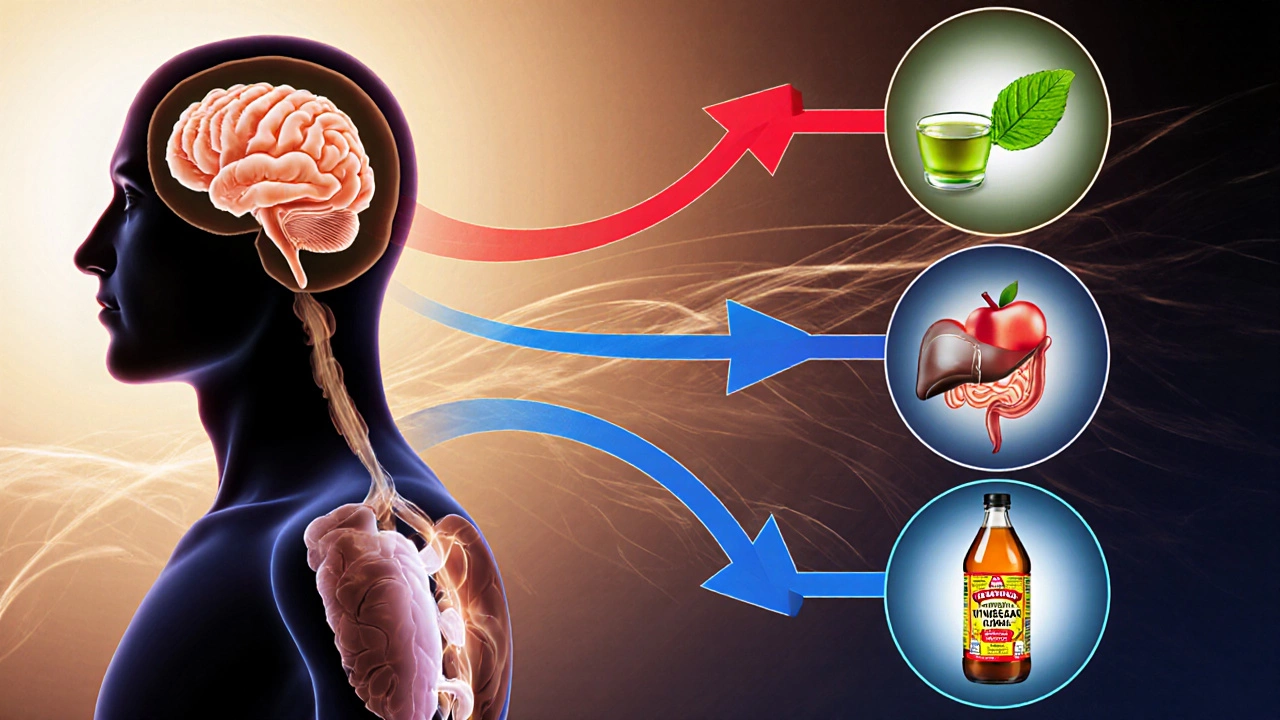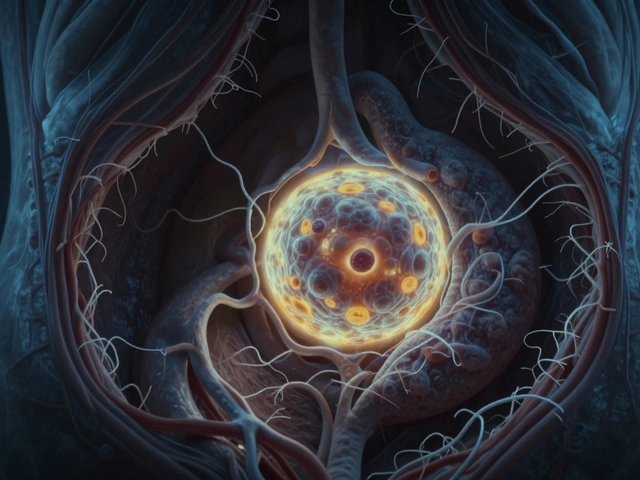Quick Summary & Key Takeaways
- Green tea, black coffee, apple cider vinegar, ginger tea, and lemon water are the top five drinks shown to boost belly‑fat metabolism.
- Thermic effect, caffeine, catechins, and acetic acid are the main compounds that raise calorie burn.
- Consistent intake (2‑3 cups daily) combined with a balanced diet yields the best results.
- Watch for side effects like caffeine jitters, tooth enamel erosion, or digestive upset.
- Use the comparison table to pick a drink that fits your taste, lifestyle, and health profile.
Why a Drink Can Influence Belly Fat
When we talk about “burning belly fat,” we’re really talking about increasing the body’s overall thermogenesis - the amount of energy you expend just by being alive. Certain beverages contain compounds that stimulate the nervous system, enhance fat oxidation, or improve insulin sensitivity. Those effects aren’t magic; they add up over weeks and months, especially when combined with regular movement and a modest calorie deficit.
Three mechanisms matter most:
- Stimulant‑induced thermogenesis: Caffeine and similar alkaloids raise heart rate and release adrenaline, prompting the body to tap into stored fat for fuel.
- Polyphenol‑driven fat oxidation: Plant‑based antioxidants such as catechins can boost the activity of enzymes that break down fatty acids.
- Acidic fermentation: Acetic acid, found in fermented drinks, can slow carbohydrate absorption, helping keep insulin spikes low - a key factor for belly‑fat storage.
Understanding these pathways helps you pick a drink that aligns with your health status. For example, if you’re sensitive to caffeine, a polyphenol‑rich tea might be better than a coffee‑heavy routine.
Top 5 Fat‑Burning Drinks Backed by Research
The following drinks have the strongest evidence from clinical trials, meta‑analyses, or well‑controlled human studies conducted up to 2024.
Green Tea is a lightly caffeinated beverage rich in catechins, especially epigallocatechin‑gallate (EGCG). Studies show that 3‑4 cups daily can raise daily energy expenditure by 4‑5% and improve abdominal fat loss when paired with a calorie‑controlled diet.
Black Coffee is a high‑caffeine drink that delivers 95‑200mg of caffeine per 8‑oz serving. Research indicates that caffeine alone can increase resting metabolic rate by 3‑7% for up to three hours after consumption.
Apple Cider Vinegar is a fermented apple juice containing 5‑7% acetic acid. Controlled trials report a modest 2‑3% reduction in waist circumference after daily doses of 1-2tablespoons diluted in water.
Ginger Tea is a hot infusion made from fresh ginger root, containing gingerol and shogaol compounds. These bioactives have been shown to increase thermogenesis and improve lipid profiles in overweight adults.
Lemon Water is still or sparkling water flavored with fresh lemon juice, delivering vitaminC and a mild acidity. While the direct calorie‑burn effect is small, the drink promotes satiety and can replace sugary sodas, indirectly supporting belly‑fat loss.

How to Incorporate Each Drink Into Your Daily Routine
Consistency beats occasional binge‑drinking. Below are practical ways to add each beverage without disrupting your schedule.
- Green Tea: Brew a bag or loose leaves for 3‑5minutes. Drink it warm or iced, 30minutes before breakfast and again after lunch.
- Black Coffee: Stick to 1‑2 cups in the morning. Avoid adding sugar or heavy cream; a splash of almond milk works fine.
- Apple Cider Vinegar: Mix 1tablespoon in a 250ml glass of water. Start with half a tablespoon if you have a sensitive stomach, and consume it before dinner.
- Ginger Tea: Slice 1‑2cm of fresh ginger, steep in boiling water for 10minutes, then add a dash of honey if needed. Sip during mid‑afternoon slump.
- Lemon Water: Squeeze half a lemon into a bottle of cold water and keep it in the fridge. Drink it first thing after waking up.
Safety, Side Effects, and Who Should Avoid Certain Drinks
Even “healthy” drinks can cause trouble if you overdo them or have specific conditions.
- Caffeine sensitivity: If you experience jittery nerves, insomnia, or rapid heartbeat, limit coffee to one cup and rely more on tea.
- Acidic erosion: Apple cider vinegar and lemon water can wear down tooth enamel. Use a straw and rinse your mouth with plain water afterward.
- Stomach issues: High doses of ginger or vinegar may trigger heartburn. Start with small amounts and monitor tolerance.
- Pregnancy & breastfeeding: Consult a healthcare professional before consuming large amounts of caffeine or vinegar.
Overall, the key is moderation-most studies that saw benefits used 2‑3 servings per day, which is generally safe for healthy adults.
Comparison Table - Which Drink Fits Your Goals?
| Drink | Estimated Calorie Burn (% of resting Metabolic Rate) |
Key Fat‑Burning Compound | Recommended Daily Intake | Notable Side Effects |
|---|---|---|---|---|
| Green Tea | 4‑5% | EGCG (Catechin) | 3‑4 cups | Possible caffeine jitters |
| Black Coffee | 3‑7% | Caffeine | 1‑2 cups | Insomnia, palpitations |
| Apple Cider Vinegar | 2‑3% | Acetic Acid | 1‑2 tbsp diluted | Tooth enamel erosion |
| Ginger Tea | ~3% | Gingerol, Shogaol | 1‑2 cups | Heartburn, mild GI upset |
| Lemon Water | ~1% | VitaminC & Citric Acid | 2‑3 glasses | Enamel wear if over‑consumed |

Additional Fat‑Burning Beverages Worth Mentioning
If you want variety, consider these scientifically noted options. They didn’t make the top‑five list but still offer modest thermogenic benefits.
- Oolong Tea: Mid‑range oxidation between green and black tea, providing both caffeine and polyphenols.
- Matcha Powder: Whole‑leaf green tea ground into a powder, delivering higher EGCG concentrations per serving.
- White Tea: Least processed tea, rich in catechins with a gentle caffeine boost.
All three can be swapped into your routine, especially if you crave a different flavor profile.
Putting It All Together - A Sample 7‑Day Plan
Below is a simple schedule that integrates the top drinks while keeping calorie intake around a 500‑kcal deficit (the sweet spot for sustainable weight loss).
- Morning (upon waking): 1 glass of lemon water
- Breakfast: 1 cup of green tea (no sugar)
- Mid‑morning snack: optional plain water
- Lunch: 1 cup of black coffee (black or with splash of milk)
- Afternoon (3PM): 1 cup of ginger tea
- Dinner: 1 tablespoon of apple cider vinegar mixed in water
- Evening: 1 cup of green tea or oolong tea as a wind‑down
Adjust the schedule based on personal tolerance. The goal is to keep the drinks spaced out, preventing caffeine crashes and ensuring steady thermogenic activity throughout the day.
Frequently Asked Questions
Can drinking these beverages alone shrink my waist?
No. They act as metabolic boosters. Real waist reduction comes from a sustained calorie deficit, regular exercise, and overall healthy eating.
How much caffeine is safe for most adults?
The general consensus is up to 400mg per day, roughly four 8‑oz cups of coffee. If you’re sensitive, keep it below 200mg.
Will apple cider vinegar affect my blood sugar?
Yes, modestly. Acetic acid can improve insulin sensitivity, helping blunt post‑meal glucose spikes. People on insulin should monitor levels closely.
Is it okay to add honey or sugar to these drinks?
Adding sweeteners adds extra calories and can counteract the benefit. If you need sweetness, a tiny drizzle of raw honey (under 5g) is acceptable, but keep it occasional.
Do these drinks work for people with thyroid issues?
Caffeine can interfere with thyroid medication absorption, so take coffee at least 30minutes apart from levothyroxine. Green tea’s catechins are generally safe, but always check with your doctor.





